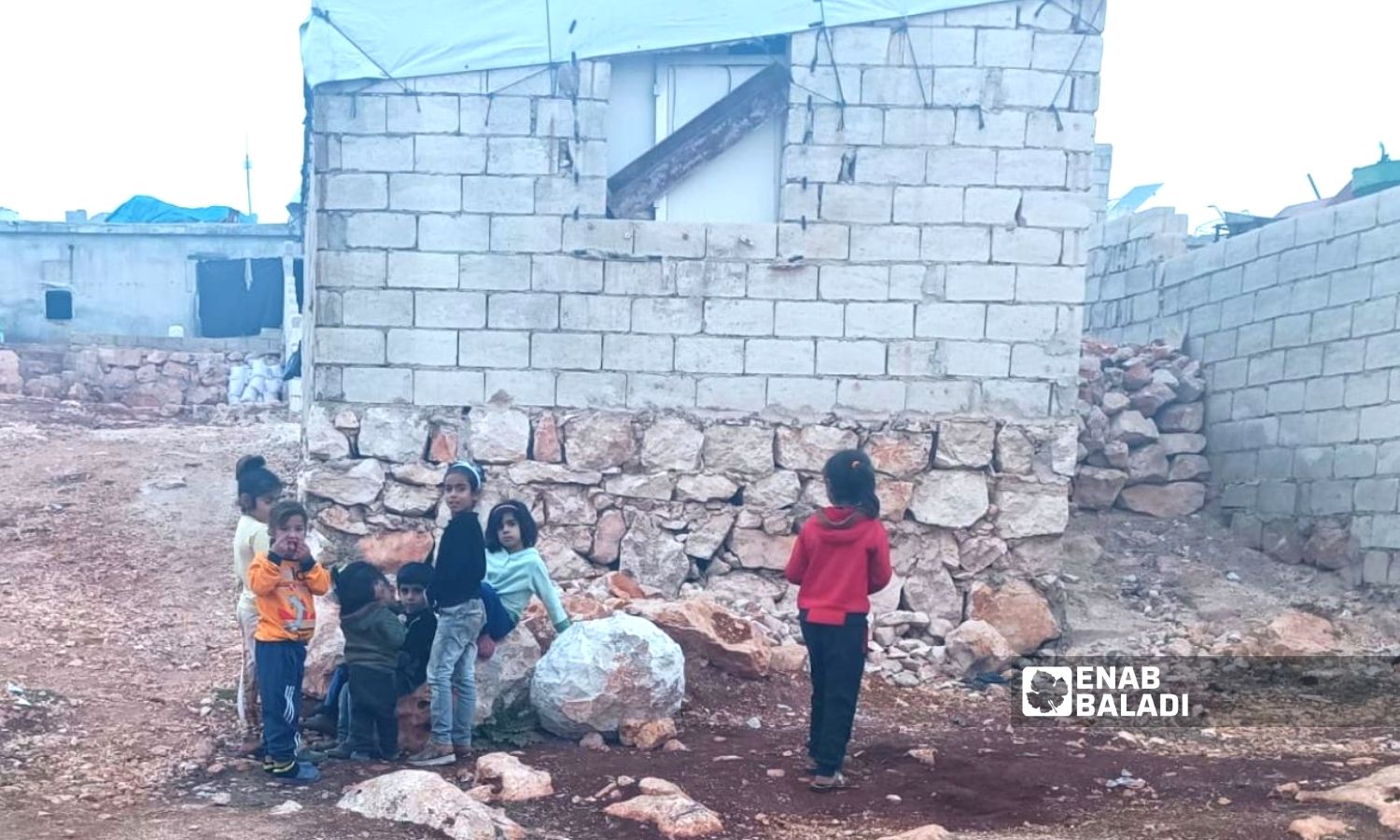



Idlib – Huda al-Kulaib
“There is no doubt that the arms of parents are the best refuge for children, but I do my best to take care of my two orphaned nephews,” says the 41-year-old Hanan al-Shardoub, a responsibility she bears after her brother was killed in a bombing on the city of Maarat al-Numan in 2018 and his wife traveled to Turkey after her marriage again.
The two children’s aunt decided to upbring them as they were left without a breadwinner or caretaker amid fears of being exposed to the harsh conditions of life.
They are young, the eldest of whom is less than six years old, al-Shardoub told Enab Baladi.
The years of conflict in Syria have left many children orphans, some of whom have lost one of their parents and some of them have lost both, and with the lack of orphanages in the northern Idlib governorate, some families bear the responsibility of upbringing children who have lost their parents and uniting them by kinship.
These families also have children, and accordingly, they brought their children together with their orphaned relatives and worked to provide a family environment to contain and care for them, which might negatively affect their social and psychological lives.
Al-Shardoub works as a servant in one of the private schools in the town of al-Dana, for a monthly wage that does not exceed 2000 Turkish liras (about 100 US dollars), which is barely enough to meet basic needs and provide for her family, which consists of four children and a husband who suffers from diabetes.
Al-Shardoub is trying to give the two orphan children whatever safety and protection she can, despite her modest income, in order for them to feel a normal family environment at a time when they are in dire need, she said.
Al-Shardoub’s situation is not unique in northwestern Syria, which embraces more than four million people. In the camps of the border town of Sarmada with Turkey, where the worn-out tents and the scarcity of the necessities of life experienced by the displaced, two seventy-year-old grandparents are sheltering their three grandchildren after their daughter and her husband were killed in a bombing on Jabala village in late 2017.
The grandfather, Hassan al-Sawaf, told Enab Baladi that he and his wife are trying to manage their grandchildren’s needs through the aid they can get.
Al-Sawaf, who expressed his grief over this, is unable to provide everything the children need, noting that he does not have a stable income and that he lost all his livelihood in the conflict.
Despite this, the grandfather and his wife do not hesitate to give the parental love and feelings that orphan children need. “So that they do not feel the loss of their family or inferiority from their other peers,” as he said.
Al-Sawaf added that he is working to sell some of the relief baskets and food rations that he gets on a monthly basis in order for the children to go to school and provide them with educational supplies.
Despite the absence of statistics on the number of Syrian orphans during the years of the conflict, the Turkish Yetim Vakfı organization estimated the number of Syrian orphans in Idlib governorate alone at about one million and 200,000 orphans, according to the latest statistics issued by the non-governmental organization in May 2021.
Noha al-Khatib, a psychological and social counselor, believes that “the idea of custody is the best solution to preserve the future of orphaned children because it gives them a life in a family atmosphere that guarantees them a safe and stable environment.”
Al-Khatib told Enab Baladi that the children’s loss of their parents is one of the most difficult experiences they go through, and it gets worse the younger the loss, which makes them feel weak, lonely, and insecure.
Al-Khatib stressed the need to create institutions specialized in caring for and rehabilitating families who take care of orphaned children and to assist those families in providing their needs, such as food, health, psychological, educational, and social needs, especially if the “foster” family has poor financial capabilities.
For his part, personal status lawyer Abdul-Razzaq al-Ismail denied that there are government agencies that follow up on orphaned children who have lost their parents.
Custody of children, from a legal and Sharia point of view, is for the mother first, and in the absence of the mother, it is for the grandmother (the mother’s mother), then for the father, then for the father’s mother, according to the lawyer.
Al-Ismail pointed out that the orphans who are embraced by charities or by relatives or strangers have no government agency following them up.
The Syrian Salvation Government (SSG), the civil umbrella of Hayat Tahrir al-Sham (HTS) that runs the Idlib region and parts of the countryside of Aleppo and Latakia, suffers from a dense population as a result of the displacement waves from other Syrian regions over the conflict years amid the difficulty in reaching many of the relatives of these orphans to them, the tightening of the lines of contact between the military factions and the restriction of visits from Turkey in the Syrian north.
if you think the article contain wrong information or you have additional details Send Correction